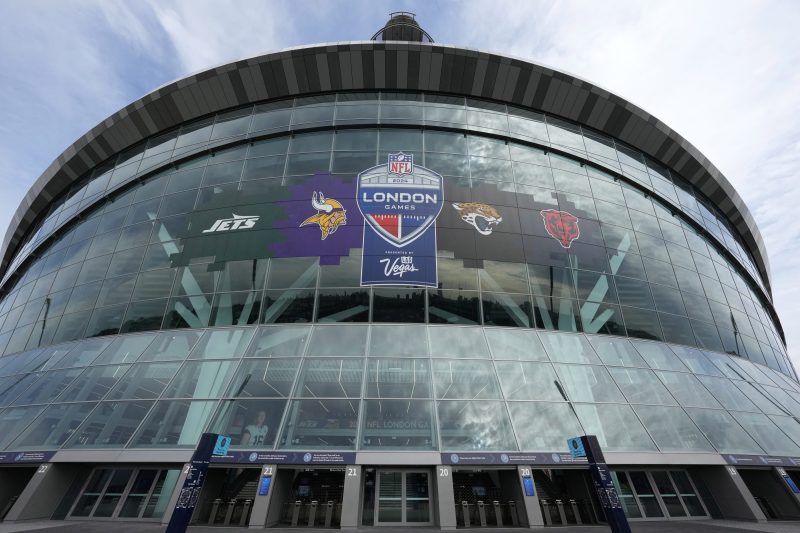The NFL is expanding its global footprint with a record number of international games this season.
Teams are developing strategies to manage travel, jet lag, and distractions for overseas games.
Coach Sean Payton has learned from past experiences to better prepare his team for international contests.
The league may eventually expand to a 16-game international series, requiring all 32 teams to play abroad.
Sean Payton has learned from experience. The last time he coached a game in London, with the New Orleans Saints in 2017, the perky strategist got jammed up during pregame festivities at Wembley Stadium after Darius Rucker sang ‘The Star-Spangled Banner.’
“I had a mess-up the last time,” Payton told reporters in London this week, prepping for his Denver Broncos to meet the New York Jets at Tottenham Hotspur Stadium on Sunday.
Payton has a good vibe with Rucker, the Miami Dolphins fan of Hootie and the Blowfish fame, and was caught up in the moment.
“I was kind of excited about how it was all put together and I jogged to the middle of the field and I forgot about ‘God Save The Queen,’” Payton recalled, alluding to the British national anthem. “Then I sat there at the 50-yard line just kind of like a cat burglar and took my visor off and was embarrassed. So, I’ll make sure to be prepared for the second anthem. That was clumsy.”
Consider Payton an in-house expert now for managing tweaks and nuances attached to the international games increasingly becoming part of the NFL’s “new normal” as the league expands its global footprint.
NFL’s slate of international games will only grow
Wake up! The NFL is staging a record seven international regular-season games this season, with all but the first one in Week 1 (Chiefs-Chargers, Sao Paulo, Brazil) starting at 9:30 a.m. ET (6:30 a.m. PT) and airing on the NFL Network.
Sure, it makes for the possibility of a marathon Sunday for viewers who may opt to roll from the early international tilt through NBC’s “Sunday Night Football,” which typically ends shortly before midnight ET.
And such lineups will only escalate. Per the collective bargaining agreement (CBA) with players that runs through the 2030 season, the league can stage up to 10 international games per season without further approval from the players union. Yet even a 10-game lineup represents a mere stepping-stone to the more robust international slate that seems destined.
Ultimately, the NFL – which staged its first regular-season contest in Ireland in Week 4, and after a trio of London tilts the next three weekends will have games in Berlin and Madrid in November – will likely pursue a 16-game international series that requires all 32 teams play at least one game away from the U.S. each season. And Commissioner Roger Goodell has acknowledged that such a series could be packaged as its own media bundle when the upcoming media rights deals (and CBA) are negotiated.
Could that happen before the current CBA expires? It would entail re-opening the CBA, which might be inspired by the league opting out of existing media deals and negotiating more record-breaking TV and streaming pacts. So, like so many things NFL, follow the money for clues.
The Vikings-Steelers game on Oct. 5 was the second-most watched international game, averaging 7.9 million TV and digital viewers. That hardly compares to an average that tops 17 million for all NFL games, but it still trends in a progressive direction for the league.
In any event, NFL teams stand to help themselves by formulating keen strategy for handling international games because the overseas trips are not going away.
The NFL, international games, and circadian rhythms
If you know Payton, who just notched his 173rd career victory (tied for 14th place all-time), you know he’s all over the idea of seeking to secure advantages – physical, psychological or whatever.
That’s why the Broncos have ramped up their work with a sleep specialist to aid in the body clock adjustment from Mountain Time to UK Time. Then again, Payton was already fully engaged in psychological measures last week as the Broncos (3-2) prepared for their upset victory at Philadelphia.
“No one could use the ‘L word’ last week, anywhere,” Payton said, the L-word being London. Of course, they all knew the schedule, and that the team would embark on an extended road trip because it wouldn’t return to Denver after facing the Eagles.
Part of Payton’s point, though, was that he didn’t want his team thinking about the London game when a big challenge loomed in the City of Brotherly Love.
His concern was backed by data. The record of teams playing on the road the week before a European trip is 11-19, which marks a 36.7% winning clip.
“We just told them, ‘Friday, just have an extra suitcase. It’ll be at your hotel.’ And that was it, ” Payton said of the directive last week that was the extent of London talk.
Rather than checking out of their Philadelphia hotel before facing the Eagles, which is typical for visiting teams, the Broncos returned to the hotel after the game. They had a team meal, treatment for injuries and the coaches had a window to study videotape. Then they flew to England on Sunday night, arriving on Monday morning.
In many cases, teams prefer to arrive late in the week for international games, seeking a short turnaround. Interestingly, the Jets – now coached by Aaron Glenn, once an assistant on Payton’s staff with the Saints – also went to London on Monday despite playing at home last weekend. Under previous Jets coach Robert Saleh, the Jets flew to London on Thursday night.
Acclimation is the key word. When the Broncos arrived on Monday, the first order of business for players after checking into the hotel was a light workout – running, stretching, weightlifting and the like.
Flashback: During the 1990s, when the San Francisco 49ers traveled to London for a preseason game (the flight took the Artic route), coach George Seifert ordered the team to conduct a workout in a park – before even checking into the hotel. Seifert insisted that research concluded the immediate physical activity was the best way to deal with jet lag. No argument on that, but as a beat writer covering the team I also remember witnessing a lot of grumpy players who were not too happy with George.
Skip the distractions. It’s a business trip
Payton knows. While international games provide strong marketing opportunities for the league and teams to grow the brands, for the players and coaches it is an undeniable business trip. Which means reducing distractions.
“You want the schedule? No sightseeing,” said Payton, coaching a team in London for the third time. “We’re staying in the middle of nowhere. No sightseeing.”
After a Tuesday off-day, consistent with the NFL work week, the Broncos held their normal Wednesday and Thursday practices on the normal days. That Payton, whose team is lodged in the English countryside, reiterated the “no sightseeing” pledge is rooted in experience, too.
He remembers an idea his rambunctious Saints tight end, Jeremy Shockey, tried to hatch.
“Shockey tried to get all the passports and take the team to Amsterdam. So, we put the kibosh on that,” Payton recalled from a 2008 experience that culminated with a win against the Chargers.
Other factors are also in the mix. The Broncos were already on the East Coast; it would have been more taxing to return to Denver and then circle back for a trip to England. Besides, Payton likes the bonding opportunity. When he coached the Saints, they were displaced multiple times due to hurricane evacuations. Last year, with back-to-back games on the East Coast, the Broncos trained in between at the Greenbrier Resort in West Virginia, which is where Payton took his Saints for training camps on multiple occasions.
“This type of experience with your team I think is really positive,” Payton said. “It’s certainly an easier trip, coming off a win.”
Said Broncos linebacker Jonathon Cooper: “It definitely brings us all together, and stuff gets us out of our comfort zone a little bit to where we kind of have to forcibly hang out with each other and get to know your teammates and stuff like that. I think that’s amazing for real because we get caught up in our lives. We have families, we have kids and everything that we have to handle on a day-to-day basis. So, when you travel and you kind of separate yourself away from that, it gives more time to kind of grow as a team, grow as a unit. I think that’s only going to help us get better down the road.”
Then there are post-London considerations. Although many teams (such as the Vikings and Steelers last week) prefer a bye week after an international game, the Broncos will come home to face the New York Giants in Week 7. Denver won’t get its bye until Week 12.
Good move, according to the data. While teams are 44-41-1 overall (51% winning clip) the week after a European game, the pattern for winning skyrockets to 71% for teams that play a home game the following week, without a bye week (12-5).
Payton knows that next week he will have to manage fatigue.
“We’ve done some studies on that, interestingly enough,” Payton said.
Of course he has. There may not be an NFL coach more on the cutting edge than Payton when it comes to pursuing patterns of results and methods for recovery against the NFL grind.
“Now, we’ll be smart as to how we practice next week,” he said.
But first things first. The task for every team operating overseas is to make the work week as similar to a typical week as possible. After all, week-to-week rhythm and routine is part of the NFL’s fabric. So, there’s enormous attention to detail when it comes to practices, workout facilities and equipment, meals, meetings and other components of the NFL regimen.
“Well, you try to keep it the exact same, but it’s hard when they uproot you,” Bo Nix, Denver’s second-year quarterback, told reporters in London. “You don’t have quite the same resources, I guess. So, you try to make do with what you’ve got. But it’s definitely not going to be a normal week. Good thing I’m not superstitious or anything.”
Maybe he will get used to it with repetition. Chances are that many more international games are coming in future years. Here’s to some fish and chips.
Contact Jarrett Bell at jbell@usatoday.com or follow on X: @JarrettBell









